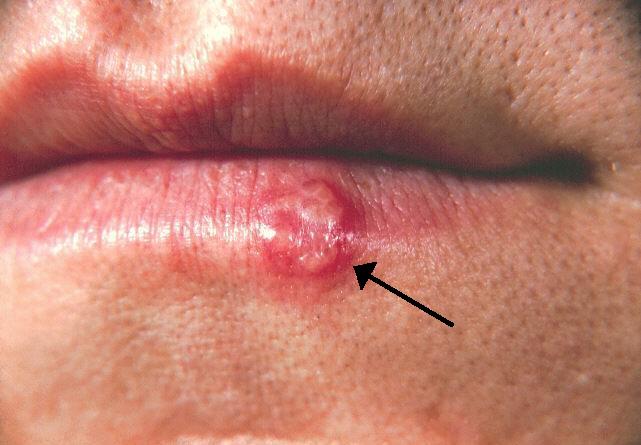Written by Dr. Ringpfeil

Herpes simplex is a common viral infection caused by two strains of the herpes simplex virus (HSV). These strains are known as herpes simplex virus-1 (HSV1) and herpes simplex virus-2 (HSV2). While HSV can infect any part of the body, it most commonly affects the oral cavity and genital area. HSV1 is responsible for most outbreaks around the mouth, while HSV2 causes the majority of genital or buttock lesions. The signs and symptoms of HSV differ depending on whether it is an oral or genital infection.
The initial infection of oral herpes, which is usually acquired through person-to-person contact like kissing, is often asymptomatic. The virus then remains dormant in a nerve root. Reactivation of the virus can be triggered by factors such as fever, intense sunlight, cold weather, or stress.
During the active stage, individuals with oral herpes develop “cold sores” around the mouth or on the face, which can become painful ulcers. The period just before the outbreak, known as the prodromal period, is when the virus can be transmitted to another person through direct contact.
The stages of genital herpes are similar to oral herpes, with an initial stage that has few symptoms and is less contagious. The secondary stage, often triggered by stress or illness, involves the development of lesions on the vulva or penis.
These lesions are often painful and itchy, and may be accompanied by difficulty urinating, tender swollen lymph nodes, and pus-like discharge. The herpes virus is most contagious during active periods but can also spread just before an outbreak occurs.
For both genital and oral herpes, the dormant period involves the virus “resting” within the nervous tissue near the initially infected area.
Herpes is commonly diagnosed based on the described symptoms and frequent recurrence in the same area. Rapid tests are available to detect antibodies to the herpes virus. A positive result indicates past exposure to HSV1 or HSV2.
However, around 90% of inner-city populations have HSV1 antibodies, and approximately 35% have HSV2 antibodies. The presence of antibodies does not confirm a current outbreak. In some cases, samples of representative lesions may be taken and tested for the presence of HSV1 or HSV2.
Once diagnosed with herpes, managing the disease involves caring for sores during outbreaks and taking steps to prevent recurrence. Several medications and dietary guidelines can be followed, along with advice on preventing the spread of the disease.
While there is no cure for herpes, several medications are available for symptom control. Famvir™, Valtrex™, and Acyclovir are commonly used to treat and prevent cold sores and genital herpes. These drugs do not cure the disease but help alleviate or prevent symptoms. Keeping lesions as dry as possible can also promote healing.
Diet plays a role, as the amino acid lysine found in fish, chicken, beef, lamb, milk, cheese, and beans has been shown to reduce outbreak recurrence. Some individuals find that daily lysine supplementation helps prevent outbreaks. Condoms can help prevent the spread of herpes between individuals.
It’s important to remember that if you have been infected with herpes, you are not alone. The disease affects many people who lead normal lives. Particularly with genital herpes, the ulcers are hidden and do not disrupt daily activities. Open communication with partners is crucial for practicing safe intercourse. During an outbreak, it is advisable to avoid contact, and medications can help alleviate symptoms.
Given the high prevalence of genital and oral herpes in the United States, with an estimated 45 million infected individuals (one in every five people), there are numerous sources of support available.
The website http://www.herpes.com provides more information about the disease. A list of support groups organized by state can be found at http://www.herpes.com/supportgroups.html. The Centers for Disease Control and Prevention (CDC) also offers information on herpes and other genital diseases at http://www.cdc.gov/std/herpes. If you suspect you have genital herpes, it is recommended to consult your physician to discuss treatment options.
Patients ask Dr. Ringpfeil answers
Please feel free to use this form to ask our dermatologists questions about this treatment.